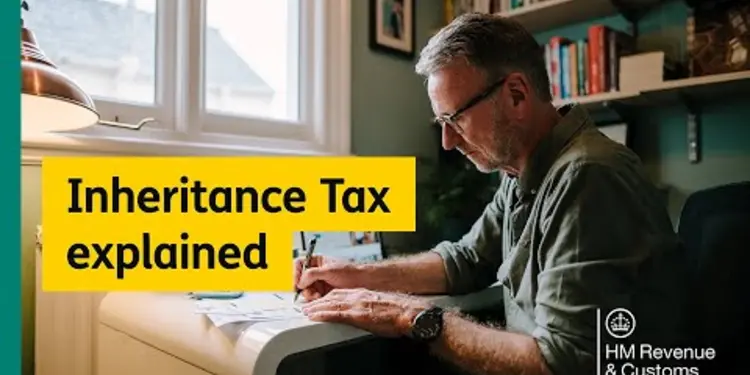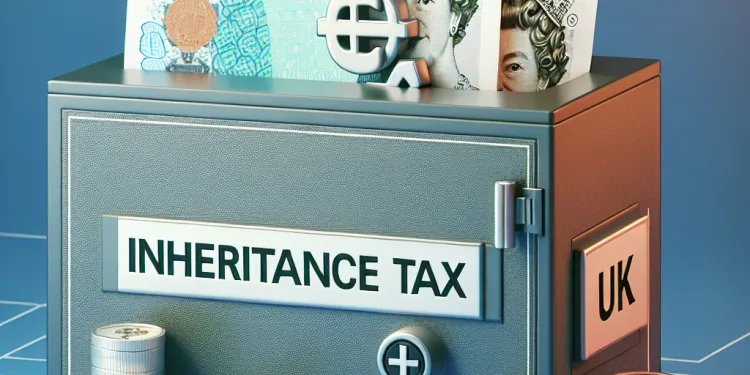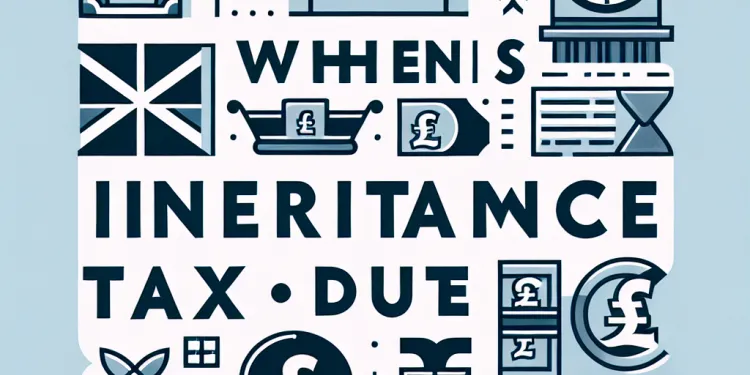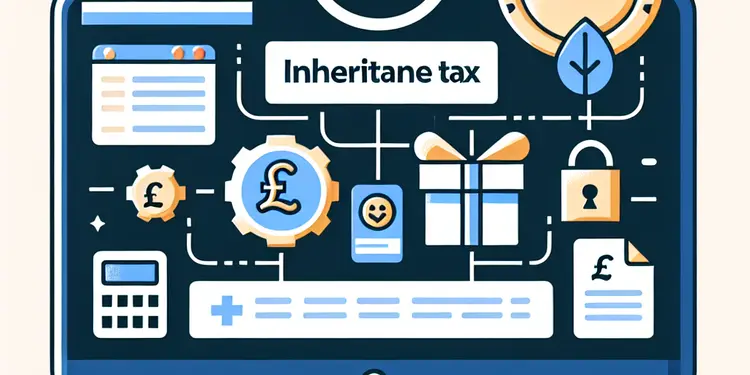
Find Help
More Items From Ergsy search
-

What gifts can be given tax-free during my lifetime?
Relevance: 100%
-

Are there tax-free thresholds for inheritance tax?
Relevance: 67%
-

Can gifting reduce future inheritance tax liabilities?
Relevance: 52%
-

Do I need to pay CGT if I gift a property?
Relevance: 40%
-

Does the value of gifts affect Inheritance Tax?
Relevance: 37%
-

How is the Inheritance Tax bill calculated?
Relevance: 31%
-

Are there any other reliefs available from inheritance tax?
Relevance: 30%
-

Can I bring gifts when I visit?
Relevance: 30%
-

What types of ISAs can I use for investments?
Relevance: 29%
-

What is the nil rate band in Inheritance Tax?
Relevance: 29%
-

What is Inheritance Tax?
Relevance: 27%
-

What is Inheritance Tax?
Relevance: 27%
-

What is inheritance tax in the UK?
Relevance: 26%
-

Who is responsible for paying Inheritance Tax?
Relevance: 25%
-

Saving for the Future: The Best ISAs to Consider Right Now
Relevance: 25%
-

How does an ISA generate passive income?
Relevance: 25%
-

Is there any inheritance tax exemption for spouses or civil partners?
Relevance: 24%
-

How can one reduce the inheritance tax burden?
Relevance: 24%
-

What is an ISA?
Relevance: 24%
-

How can I plan efficiently to mitigate inheritance tax?
Relevance: 24%
-

What is the '7-year rule' in Inheritance Tax?
Relevance: 23%
-

Are there any exemptions or reliefs available for Inheritance Tax?
Relevance: 23%
-

When do I need to pay Inheritance Tax?
Relevance: 23%
-

What is inheritance tax in the UK?
Relevance: 23%
-

What is the seven-year rule relating to inheritance tax?
Relevance: 23%
-

What Is An ISA UK (Should I have an ISA & Different Types Of ISAs)
Relevance: 22%
-

How can charitable donations affect Inheritance Tax?
Relevance: 22%
-

Are there any exemptions from inheritance tax?
Relevance: 22%
-

What assets are subject to inheritance tax?
Relevance: 22%
-

Where can I find more detailed information on inheritance tax?
Relevance: 22%
-

When is inheritance tax due to be paid?
Relevance: 21%
-

Do I need to declare my ISA income on my tax return?
Relevance: 21%
-

Do I pay Inheritance Tax on a property I inherit?
Relevance: 20%
-

When is inheritance tax due?
Relevance: 20%
-

How is inheritance tax calculated?
Relevance: 20%
-

Are there deductions available for inheritance tax?
Relevance: 20%
-

How does inheritance tax affect life insurance policies?
Relevance: 19%
-

What is inheritance tax?
Relevance: 19%
-

Is it possible to reduce the Inheritance Tax bill?
Relevance: 18%
-

What is the current Inheritance Tax threshold?
Relevance: 18%
Introduction to Tax-Free Gifts
In the United Kingdom, individuals have the opportunity to give gifts without incurring tax liabilities, provided certain rules are followed. These tax-free gifts can be a strategic way to manage your wealth while providing for loved ones. Understanding the types of gifts that qualify for tax-free treatment is crucial for effective financial planning.
Annual Exemption
One of the most common ways to give gifts tax-free is through the annual exemption. Each tax year, an individual can give away up to £3,000 without any tax implications. This exemption can be carried forward to the next year if it is unused, but only for one year. For couples, this means a potential combined annual exemption of £6,000.
Small Gifts
You can give small gifts of up to £250 per person each tax year to as many people as you like, without affecting your annual exemption limit or incurring tax. It’s important to note, however, that you cannot combine these small gifts with any other allowance for the same person.
Gifts Between Spouses
Gifts between spouses or civil partners are generally free from inheritance tax, provided both parties are permanently living in the UK. This means you can give your entire estate to your spouse or civil partner without worrying about incurring taxes on those gifts.
Wedding or Civil Ceremony Gifts
When a relative or friend is getting married or entering into a civil partnership, you can give them a tax-free gift. The amount you can give varies depending on your relationship to the individual getting married. Parents can give up to £5,000, grandparents can give up to £2,500, and anyone else can give up to £1,000. These gifts must be given before the wedding or civil ceremony takes place.
Regular Gifts from Income
Individuals can also give away regular payments from their income, provided these payments do not affect their standard of living. Such gifts might include premiums on a life insurance policy. This type of gifting can be complex, and keeping clear records is essential to ensure they qualify for tax-free status.
Considerations and Planning
While there are several opportunities to give gifts tax-free, it is important to plan carefully. Keeping thorough records of all gifts given and understanding the specific exemptions and allowances are vital to avoid unexpected tax liabilities. Consulting with a financial advisor or tax professional is recommended to make the most of these allowances and ensure compliance with tax regulations.
Conclusion
Understanding the rules surrounding tax-free gifts in the UK can allow you to share your wealth with loved ones efficiently. By taking advantage of exemptions such as the annual allowance, small gifts, and marriage gifts, you can make informed decisions that benefit both you and your beneficiaries.
Introduction to Tax-Free Gifts
In the UK, you can give gifts to people without paying any tax if you follow some rules. These gifts are called tax-free gifts. They are a smart way to manage your money and help your loved ones. Knowing which gifts are tax-free is important for planning your finances well.
Annual Exemption
One way to give gifts without paying tax is the annual exemption. Each year, you can give away up to £3,000 without paying tax. If you don’t use this in a year, you can use it the next year, but only once. If you are a couple, you can give away £6,000 in total each year.
Small Gifts
You can give small gifts up to £250 to as many people as you want each year. This doesn’t affect your £3,000 limit or add any tax. Remember, you can’t combine these small gifts with other tax-free allowances for the same person.
Gifts Between Spouses
If you give gifts to your husband, wife, or civil partner, you don’t have to pay inheritance tax, as long as you both live in the UK. You can give them all your things without worrying about tax.
Wedding or Civil Ceremony Gifts
If someone is getting married, you can give them a tax-free gift. The amount depends on your relationship to them. Parents can give up to £5,000, grandparents can give up to £2,500, and other people can give up to £1,000. These gifts should be given before the wedding.
Regular Gifts from Income
You can give regular gifts from your income, as long as it doesn’t change your usual living standard. This might include things like paying for a life insurance policy. Keep good records to make sure these gifts stay tax-free.
Considerations and Planning
It’s important to plan your tax-free gifts carefully. Keep good records of all gifts you give and know the rules. This helps you avoid unexpected taxes. It’s a good idea to talk to a financial advisor to help you use these tax-free opportunities correctly.
Conclusion
Understanding how tax-free gifts work in the UK helps you share money with your loved ones without worry. Use the annual exemption, small gifts, and marriage gifts to make smart choices for you and your family.
Frequently Asked Questions
What is the annual gift tax exclusion?
The annual gift tax exclusion is the amount you can give to someone each year without having to pay gift tax. As of 2023, it is $17,000 per recipient.
Can I give an unlimited amount to my spouse?
Yes, you can give an unlimited amount to your U.S. citizen spouse without incurring gift tax due to the marital deduction.
Does the gift tax exclusion apply to each recipient?
Yes, the exclusion applies to each recipient. You can give up to $17,000 to as many people as you wish each year.
What if I give more than the annual exclusion amount?
If you give more than the annual exclusion amount, you may need to file a gift tax return, but you can apply it against your lifetime estate and gift tax exemption.
What is the lifetime gift tax exemption?
As of 2023, the lifetime exemption is $12.92 million, which is the total amount you can give away tax-free over your lifetime and at death.
Do I need to report gifts under the annual exclusion?
No, you generally do not need to report gifts that do not exceed the annual exclusion limit.
Are there any exceptions to the gift tax?
Yes, educational tuition and medical expenses paid directly to the institution or provider are not subject to gift tax.
Is there a limit to the number of gifts I can give tax-free?
No, there is no limit to the number of recipients as long as each gift does not exceed the annual exclusion amount.
Do I have to pay taxes on gifts I receive?
Generally, the recipient of a gift does not have to pay gift tax, as it is the giver's responsibility.
Can I combine my gift tax exclusion with my spouse?
Yes, married couples can combine their exclusions to give a total of $34,000 to any individual without gift tax consequences.
What qualifies as a gift?
A gift is any transfer where you receive nothing or less than the full value in return.
Do gifts to charities count against my gift tax exclusion?
No, gifts to qualified charities are not subject to gift tax.
Can I give my children gifts tax-free to help with their education?
Yes, you can pay tuition directly to the educational institution, which is not counted as a gift.
Can I use the exclusion for gifts to non-U.S. citizen spouses?
Yes, but there's a special annual limit of $175,000 for gifts to non-U.S. citizen spouses in 2023.
Does the annual gift exclusion amount change?
Yes, it is adjusted for inflation, though it may not change every year.
How do I file a gift tax return?
File IRS Form 709 to report gifts exceeding the annual exclusion or to allocate part of your lifetime exemption.
Is a loan considered a gift?
An interest-free or below-market loan could be considered a gift for the forgone interest.
Are there any gifts that are completely exempt from taxes?
Yes, direct payments for medical expenses and tuition to providers are fully exempt.
Does giving a gift affect the recipient's income tax?
No, gifts generally do not affect the recipient's income tax.
How does the gift tax relate to estate tax?
Gifts exceeding the annual exclusion count against your lifetime estate and gift tax exemption, reducing the amount that is tax-free at death.
What is the yearly gift tax rule?
The yearly gift tax rule is about giving presents.
It lets you give someone a special kind of present each year.
You don't have to pay a tax if your gift is under a certain amount.
This amount can change, so you might ask a helper or use a calculator.
Using pictures or talking with someone can make this easier to understand.
The gift tax is a rule about giving presents. Every year, you can give a certain amount of money to someone without paying extra money called 'gift tax'.
As of 2023, you can give $17,000 to each person without paying gift tax.
If you have trouble reading or understanding numbers, you can ask someone for help. You can also use tools like a calculator or a writing app that reads text out loud to you.
Can I give my spouse as much as I want?
You can give as much as you want to your husband or wife who is a U.S. citizen. You will not have to pay a gift tax. This is because of a rule called the marital deduction.
Can you give money to each person without paying gift tax?
Yes, this rule works for each person you give money to. You can give up to $17,000 to as many people as you want every year.
What happens if I give more money than I am allowed?
If you give someone more money than the allowed amount for the year, it could affect taxes. You might have to pay extra. It's good to keep track of how much you give.
You can use a notebook or a phone app to write down and remember the money you give away.
If you give someone a gift that is very big, you might have to tell the government. You can still use part of your big gift allowance that you get for your whole life.
Here are some tips to help understand this:
- Use simple words when thinking about gifts and taxes.
- Ask someone to help if it feels tricky. Talking with a friend or family member can help.
- There are tools like calculators online that can help you see how much you can give as a gift.
What is the lifetime gift tax exemption?
The lifetime gift tax exemption is a rule. It says how much money you can give to others without paying extra money to the government, called tax.
It helps people give gifts and money to friends or family over their lifetime.
If you want help understanding, ask a family member, friend, or use a calculator to see how much you can give.
In 2023, you can give away up to $12.92 million. You do not have to pay taxes on this money. This is the total amount you can give to others during your life and after you pass away.
Do I have to tell anyone about gifts that are part of the yearly limit?
No, you usually don't have to tell anyone about gifts if they are not too big. You can give small gifts without a problem.
Are there special rules for the gift tax?
Sometimes, you do not have to pay extra money when you give a gift. Here are some special rules:
- You can give some money to your husband or wife without extra cost.
- You can help pay for someone's school or doctor bills without extra cost, but you must pay the school or doctor directly.
- You can give small amounts of money to other people without extra cost each year.
- You can give gifts to charities without extra cost.
If you have questions about the gift tax, you can ask for help. You can talk to a tax advisor or use online tools to learn more.
If you pay for school or medical bills straight to the school or doctor, you don't have to pay a gift tax.
Can I give only a certain number of gifts without paying tax?
No, you can give gifts to as many people as you want. Just make sure each gift is not more than the allowed amount for the year.
Do I need to pay money to the government for gifts I get?
When you get a gift, you usually do not have to pay a gift tax. The person who gives the gift is the one who has to pay it.
Can I share my gift tax limit with my husband or wife?
Yes, husbands and wives can join their gift limits. Together, they can give up to $34,000 to one person without paying extra tax.
What is a gift?
A gift is something you give to someone else. It can be for a birthday, holiday, or just because you want to be nice.
Here are some things that can be gifts:
- Toys
- Books
- Clothes
- Food treats
Remember, a gift is special because it shows you care.
If reading is tricky, try using tools like audiobooks or ask someone to read with you.
A gift is when you give someone something, and you don't get anything back, or you get less than what you gave.
Do gifts to charities affect my gift tax limit?
No, when you give a gift to a charity, you do not have to pay a gift tax. A charity is a group that helps people.
Can I give my kids gifts without paying tax to help with school?
You can give gifts to your kids for school. Sometimes, you don't have to pay tax on these gifts.
Here are some ways to help:
- Ask a tax expert to make sure you follow the rules.
- Keep track of what you give.
Yes, you can pay for school costs straight to the school. This payment is not a gift.
Can I give gifts to my husband or wife who is not from the U.S. without paying taxes?
Yes, you can, but there is a special rule. In 2023, you can give up to $175,000 each year to a husband or wife who is not from the U.S.
You can use pictures or talk to someone for help if you need more support.
Does the gift limit amount change each year?
Yes, the amount changes with prices, but it might not change every year.
How do I do a gift tax return?
Here is how you can do a gift tax return:
- Get a form called a "gift tax return." You can ask an adult to help you find it.
- Write your name and the name of the person who got the gift.
- Write down how much the gift is worth. You can ask an adult if you need help with this.
- Send the form to the right place. An adult can help with this part too.
Some tools that can help you are a calculator for adding up numbers and a calendar to know the dates.
Use IRS Form 709 to tell the government about gifts you gave that are more than the allowed amount each year, or to use some of your lifetime gift allowance.
Is a Loan a Gift?
A loan is money you borrow. You have to pay it back.
A gift is something someone gives you. You do not pay it back.
So, a loan and a gift are different.
If you need help reading, you can ask someone to read with you or use a reading app. These can make it easier to understand.
An interest-free or very cheap loan is like a gift because you save money on interest.
Do some gifts not have to have tax paid on them?
Some gifts do not need tax. Here are some tips to help:
- Ask a grown-up for help.
- Use a calculator to check money.
- Read slowly and ask questions if you do not understand.
Yes, when you pay for medical bills or school fees directly to the doctor or school, it is completely allowed.
Will a gift change the taxes of the person who gets it?
No, when you get a gift, it usually does not change how much tax you pay.
How are gift tax and estate tax connected?
When you give away money or things, you might have to pay a tax called the gift tax.
When someone dies, their money and things might also get taxed. This is called the estate tax.
Both these taxes can affect how much you can pass on to others.
You can use tools like a calculator to help with taxes. An adult can also help you understand these taxes better.
If you give a gift that's bigger than a certain amount each year, it takes away from the total amount you can give before taxes are charged when you die.
Useful Links
This website offers general information and is not a substitute for professional advice.
Always seek guidance from qualified professionals.
If you have any medical concerns or need urgent help, contact a healthcare professional or emergency services immediately.
Some of this content was generated with AI assistance. We’ve done our best to keep it accurate, helpful, and human-friendly.
- Ergsy carfully checks the information in the videos we provide here.
- Videos shown by Youtube after a video has completed, have NOT been reviewed by ERGSY.
- To view, click the arrow in centre of video.
- Most of the videos you find here will have subtitles and/or closed captions available.
- You may need to turn these on, and choose your preferred language.
- Go to the video you'd like to watch.
- If closed captions (CC) are available, settings will be visible on the bottom right of the video player.
- To turn on Captions, click settings .
- To turn off Captions, click settings again.
More Items From Ergsy search
-

What gifts can be given tax-free during my lifetime?
Relevance: 100%
-

Are there tax-free thresholds for inheritance tax?
Relevance: 67%
-

Can gifting reduce future inheritance tax liabilities?
Relevance: 52%
-

Do I need to pay CGT if I gift a property?
Relevance: 40%
-

Does the value of gifts affect Inheritance Tax?
Relevance: 37%
-

How is the Inheritance Tax bill calculated?
Relevance: 31%
-

Are there any other reliefs available from inheritance tax?
Relevance: 30%
-

Can I bring gifts when I visit?
Relevance: 30%
-

What types of ISAs can I use for investments?
Relevance: 29%
-

What is the nil rate band in Inheritance Tax?
Relevance: 29%
-

What is Inheritance Tax?
Relevance: 27%
-

What is Inheritance Tax?
Relevance: 27%
-

What is inheritance tax in the UK?
Relevance: 26%
-

Who is responsible for paying Inheritance Tax?
Relevance: 25%
-

Saving for the Future: The Best ISAs to Consider Right Now
Relevance: 25%
-

How does an ISA generate passive income?
Relevance: 25%
-

Is there any inheritance tax exemption for spouses or civil partners?
Relevance: 24%
-

How can one reduce the inheritance tax burden?
Relevance: 24%
-

What is an ISA?
Relevance: 24%
-

How can I plan efficiently to mitigate inheritance tax?
Relevance: 24%
-

What is the '7-year rule' in Inheritance Tax?
Relevance: 23%
-

Are there any exemptions or reliefs available for Inheritance Tax?
Relevance: 23%
-

When do I need to pay Inheritance Tax?
Relevance: 23%
-

What is inheritance tax in the UK?
Relevance: 23%
-

What is the seven-year rule relating to inheritance tax?
Relevance: 23%
-

What Is An ISA UK (Should I have an ISA & Different Types Of ISAs)
Relevance: 22%
-

How can charitable donations affect Inheritance Tax?
Relevance: 22%
-

Are there any exemptions from inheritance tax?
Relevance: 22%
-

What assets are subject to inheritance tax?
Relevance: 22%
-

Where can I find more detailed information on inheritance tax?
Relevance: 22%
-

When is inheritance tax due to be paid?
Relevance: 21%
-

Do I need to declare my ISA income on my tax return?
Relevance: 21%
-

Do I pay Inheritance Tax on a property I inherit?
Relevance: 20%
-

When is inheritance tax due?
Relevance: 20%
-

How is inheritance tax calculated?
Relevance: 20%
-

Are there deductions available for inheritance tax?
Relevance: 20%
-

How does inheritance tax affect life insurance policies?
Relevance: 19%
-

What is inheritance tax?
Relevance: 19%
-

Is it possible to reduce the Inheritance Tax bill?
Relevance: 18%
-

What is the current Inheritance Tax threshold?
Relevance: 18%


